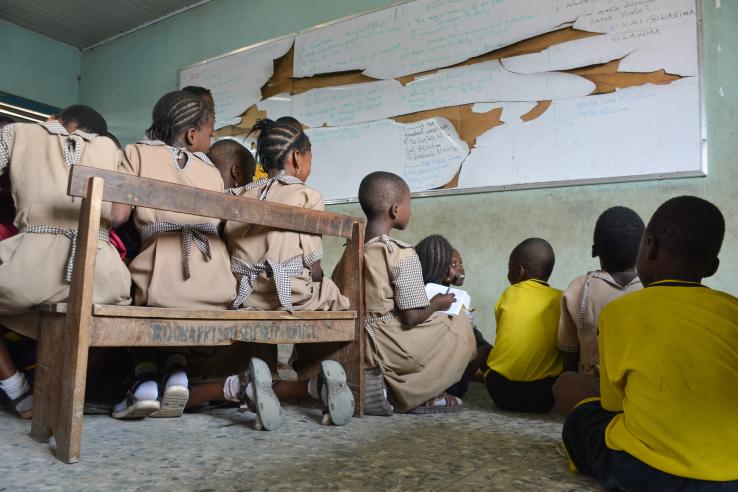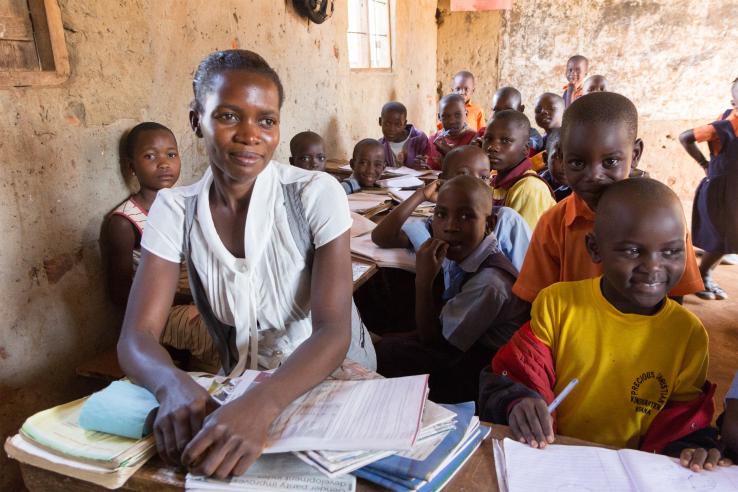Displaying 1021 - 1035 of 1266
Evaluation
In partnership with Bridges to Prosperity, the researchers are conducting a randomized evaluation across 23 districts in Rwanda to determine the impact of building footbridges on wages and agricultural technology adoption and production.
Evaluation
Researchers evaluated the impact of an early childhood psychosocial stimulation program on child development outcomes in urban Odisha, India. They found that a home-visiting stimulation program led to greater development outcomes, particularly for boys, stunted children, and children with more educated mothers.
Evaluation
Researchers are partnering with Bridge International Academies to evaluate the impact of daily quizzing on students’ learning outcomes in Kenya.
Evaluation
Researchers are partnering with Bridge International Academies to evaluate the impacts of interleaved problem sets, which allow for rapid performance feedback, on students’ learning outcomes in Nigeria.
Evaluation
Researchers are partnering with Bridge International Academies to evaluate the impact of an SMS-based information provision program on students’ learning outcomes in Kenya.
Evaluation
In Hong Kong, researchers conducted a randomized evaluation to test the impact of indirectly incentivizing protest participation on sustained participation in a political movement and to identify the role social networks play in protest turnout. Indirectly incentivizing participants to attend a political protest increased their participation regardless of how many of their peers received the same incentive. Participants’ subsequent protest participation remained persistently higher a year later, but only when at least half of their social network was also incentivized to attend the initial protest.
Evaluation
In Liberia and Malawi, researchers partnered with Innovations for Poverty Action, GiveDirectly, and USAID to evaluate the impact of an unconditional cash transfer and market access program on food security, spending, income, resilience to health shocks, intimate partner violence, and psychological well-being. In both countries, households that received cash transfers experienced lasting increases in food security, psychological well-being, and resilience to health shocks.
Evaluation
Researchers conducted two randomized evaluations in Bangladesh to study the impact of a new irrigation method and different pricing schemes on water use and conservation. The new irrigation method reduced water consumption and costs for farmers who were already paying for water by the hour, or by volume.
Evaluation
In partnership with the Latvian tax authority, researchers tested several types of emails to investigate the effect of behaviorally-informed messages on tax compliance. Messages that aimed to deter bad behavior by highlighting taxpayers’ moral obligations towards action increased on-time tax declaration submissions. In contrast, messages meant to induce social pressure did not increase on-time compliance, though they increased overall submission rates (i.e., the submission of on-time as well as late declarations).
Evaluation
Researchers partnered with the Government of Indonesia to conduct a randomized evaluation that tested whether adding questions on flat-screen televisions and cellphone SIM cards to a targeting census would change people’s reporting and actual purchases of those items. The findings suggest that while targeting may cause people to misreport what they own in the short term for some goods, it is unlikely to change people’s decisions about whether to actually purchase those items.
Evaluation
Primary school teachers in Uganda face public scrutiny and high pressure around primary school exit exam results. As a result of the incentives around students being successful on this exam, teachers focus their energy on students who could receive passing marks and encourage lower-performing students to drop out prior to taking the exam. Researchers evaluated whether an alternative teacher incentive scheme, providing rewards based on the performance of all students, could help reduce dropout and improve student math learning. Introducing the pay-for-percentile incentive scheme reduced overall student dropout rates. However, these reductions were driven almost entirely by students at intervention schools with math textbooks. Among schools with math books, the incentive scheme also improved the math achievement for higher performing students.
Evaluation
In Niger, researchers evaluated the impact of a training program for input distributors (agro-dealers) on smallholder access to and use of agricultural inputs. Researchers found that trainings for agro-dealers combined with a demonstration plot increased the share of farmers adopting improved seeds, but did not increase the quantity used to have an impact on agricultural output.
Evaluation
Researchers are measuring the impact of a quiz-style information strategy on people’s learning and adherence to Covid-19 health protocols. This study is part of a three-country research program in Ghana, the US, and Zambia aiming to find evidence on the best strategies to communicate health measures.
Evaluation
Researchers are measuring the impact of a quiz-style information campaign on people’s learning and adherence to Covid-19 health protocols. This study is part of a three-country research in the United States, Ghana, and Zambia program aiming to generate evidence on the best strategies to effectively communicate health measures.
Evaluation
Researchers are measuring the impact of a peer information sharing strategy on people’s learning and adherence to Covid-19 health protocols. This study is part of a three-country research program in Zambia, Ghana, and the US aiming to find evidence on the most effective strategies to communicate health measures.











